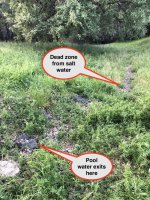- Nov 12, 2017
- 12,635
- Pool Size
- 12300
- Surface
- Plaster
- Chlorine
- Salt Water Generator
- SWG Type
- Pentair Intellichlor IC-40
Whether you use a salt water chlorine generator (SWG) or liquid chlorine (LC), all pools are, or become, saltwater pools eventually. SWG pools are based on it, LC pools acquire salt over time, as chlorine, muriatic acid and humans all leave salt behind (which never evaporates and builds up).
Salt leaves your pool in a number of ways, like when kids splash it out, or when it rains enough to push salt water out of your over-flow system, or if you exchange water, or backwash your sand filter, etc. But generally, it's always present in your pool.
So where does that water and salt go, when it splashes out or overflows? If it goes into your garden, plan accordingly. If you're designing a new pool and backyard landscaped oasis, don't forget about this issue. You can find plants that are OK with the level of salt in a swimming pool, but keep even those a decent distance from the water's edge. And you can send excess pool water to a "dumping ground," via proper drainage in your deck and a built-in overflow system. But you shouldn't rely on your street for this, as most municipalities don't want you to send pool water into their sewer systems, or gutters, because of where that salt ends up (like in a local stream or lake).
My city wants me to dump pool water into an open field. And I happen to have one behind my pool. I noticed this yesterday. It's been raining here pretty good, and my overflow system has been performing mini-water exchanges for me all winter. My salt and CH were all lower this Spring, which is great for maintaining my target chemical levels. CYA, too, but that's an easy fix. But even the rain-diluted excess pool water did this, just past where my overflow pipe exits, in a field of weeds that would otherwise survive just about anything.

I've always been concerned about what my pool water might do to a grove of trees behind me. But this "path" ends well short of the trees. The salt is still going to work its way down to them, I'm sure, but at least it's going to take a very long time, and by then may be diluted enough for the trees to withstand.
I'm just grateful whoever planned my landscaping and pool thought to (or was made to) include a good drainage system that ends well past my garden.
Salt leaves your pool in a number of ways, like when kids splash it out, or when it rains enough to push salt water out of your over-flow system, or if you exchange water, or backwash your sand filter, etc. But generally, it's always present in your pool.
So where does that water and salt go, when it splashes out or overflows? If it goes into your garden, plan accordingly. If you're designing a new pool and backyard landscaped oasis, don't forget about this issue. You can find plants that are OK with the level of salt in a swimming pool, but keep even those a decent distance from the water's edge. And you can send excess pool water to a "dumping ground," via proper drainage in your deck and a built-in overflow system. But you shouldn't rely on your street for this, as most municipalities don't want you to send pool water into their sewer systems, or gutters, because of where that salt ends up (like in a local stream or lake).
My city wants me to dump pool water into an open field. And I happen to have one behind my pool. I noticed this yesterday. It's been raining here pretty good, and my overflow system has been performing mini-water exchanges for me all winter. My salt and CH were all lower this Spring, which is great for maintaining my target chemical levels. CYA, too, but that's an easy fix. But even the rain-diluted excess pool water did this, just past where my overflow pipe exits, in a field of weeds that would otherwise survive just about anything.

I've always been concerned about what my pool water might do to a grove of trees behind me. But this "path" ends well short of the trees. The salt is still going to work its way down to them, I'm sure, but at least it's going to take a very long time, and by then may be diluted enough for the trees to withstand.
I'm just grateful whoever planned my landscaping and pool thought to (or was made to) include a good drainage system that ends well past my garden.

